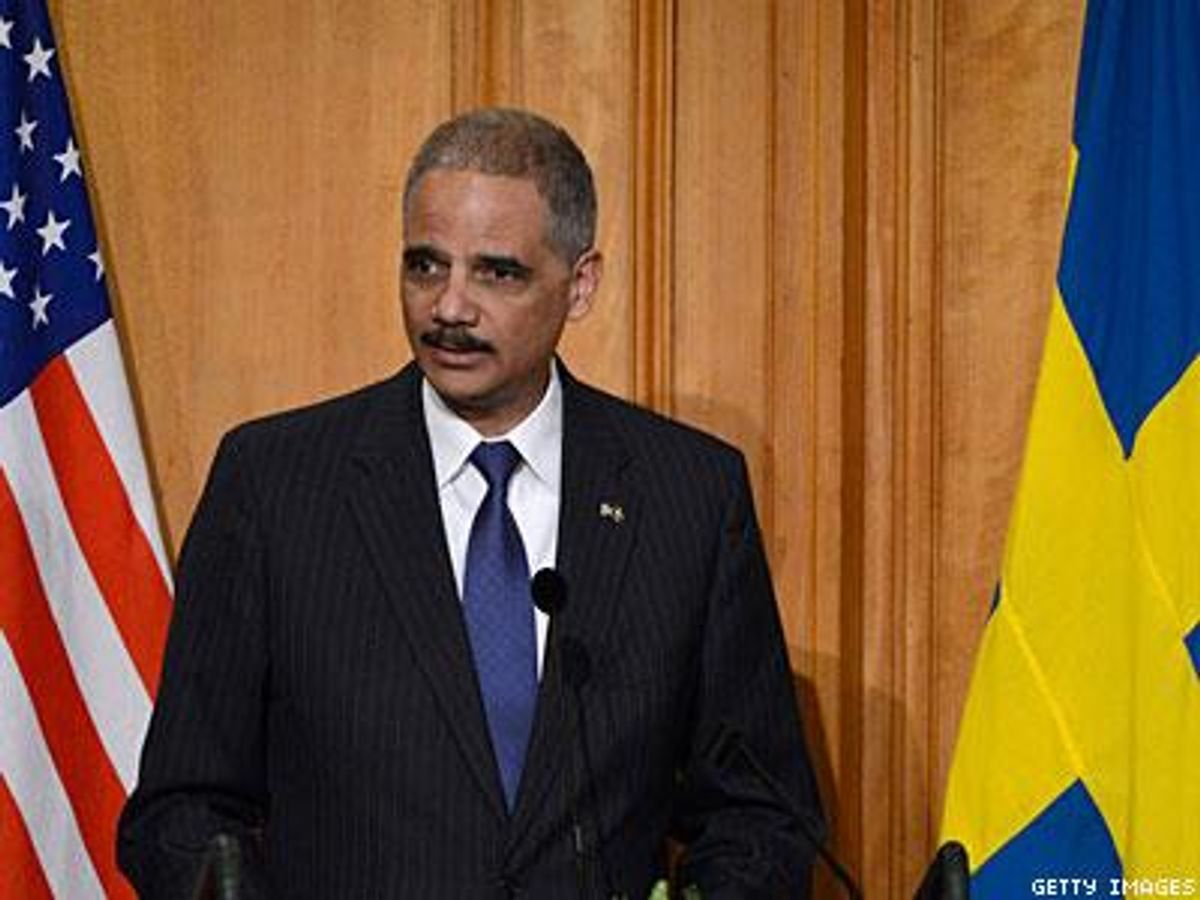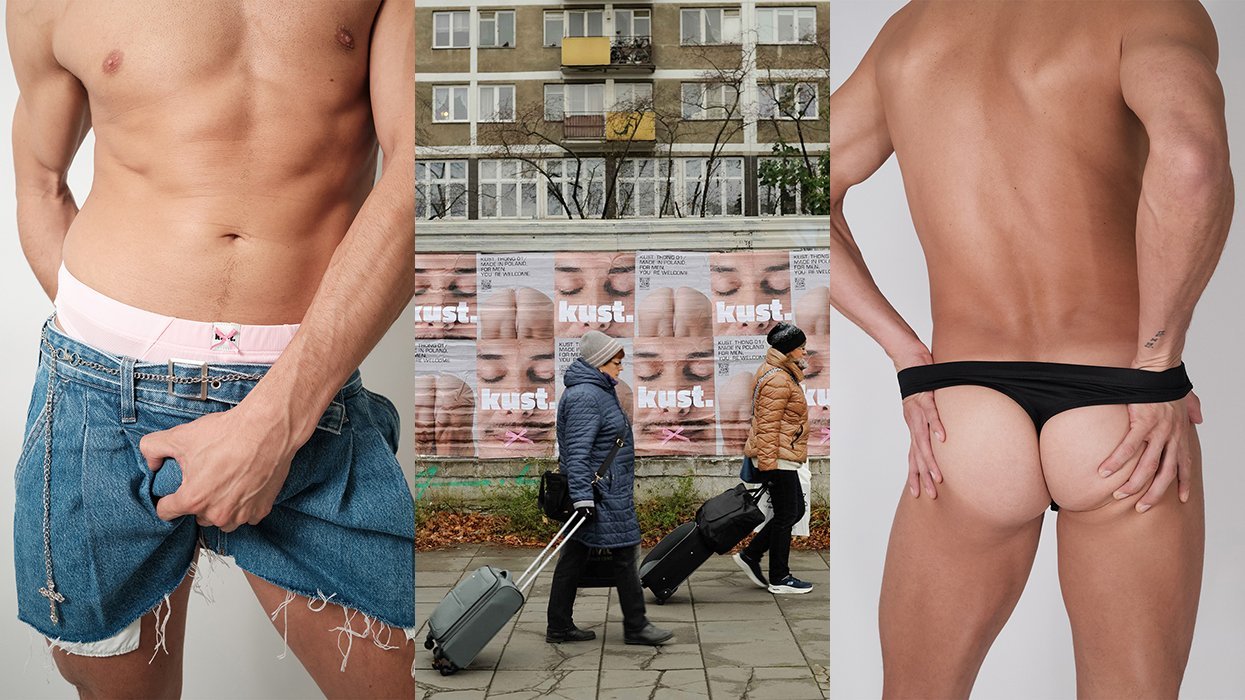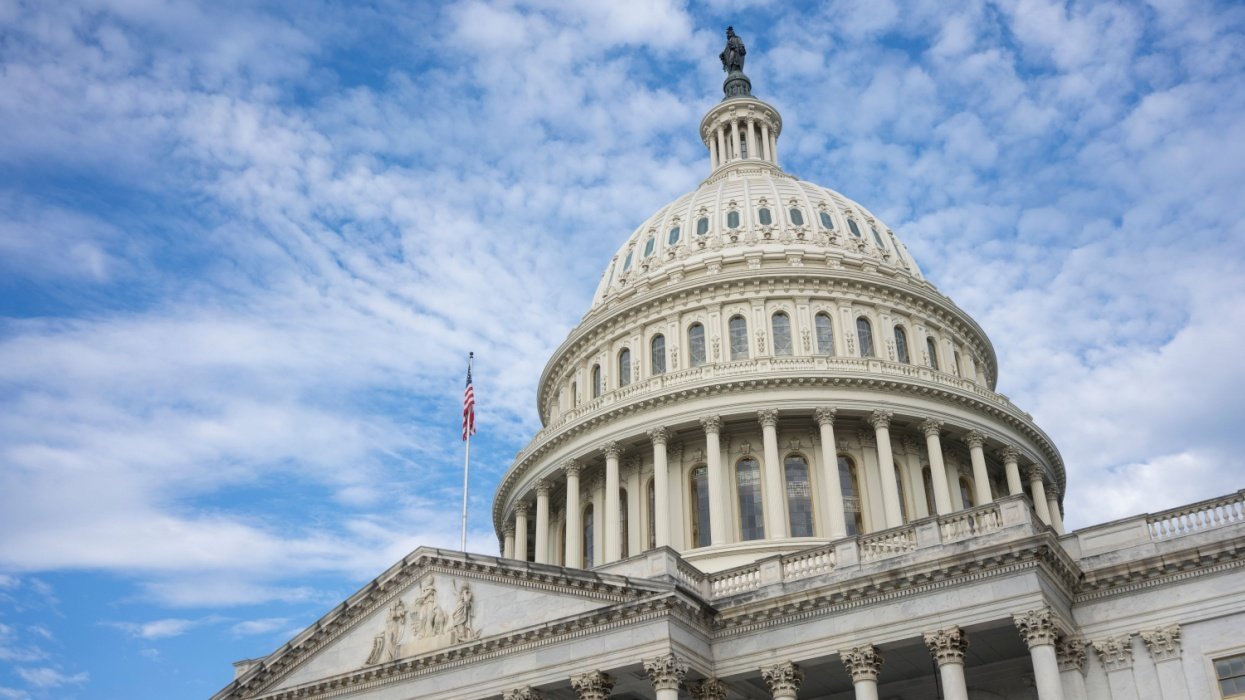The U.S. Attorney General delivered a moving speech to the Parliament of Sweden that strongly advocated for a partnership in the advancement of LGBT rights.
In his remarks delivered Tuesday, which are notable as the attorney general's most pro-LGBT to date, Eric Holder evoked the progress both nations have made -- from Sweden's longstanding role as a "champion of human rights" to the advancements engendered by the Civil Rights movement in the United States.
"But the reality is that our work -- in the United States, in Sweden, and around the world -- is far from over," he cautioned. "In so many ways, the promises of our respective Constitutions have yet to be fully realized."
By citing the landmark victory at the Supreme Court in U.S. v. Winsdor, hate crimes legislation, and the repeal of "don't ask, don't tell," Holder positioned equality for LGBT Americans as the forefront of this work, arguing that it is among "the defining civil rights challenges of our time." He bolstered this message with quotations from President Obama, who had stated on a September visit to Sweden:
"We share a belief in the dignity and equality of every human being; that our daughters deserve the same opportunities as our sons; that our gay and lesbian brothers and sisters must be treated equally under the law; that our societies are strengthened by diversity."
Discussing the upcoming Winter Olympics in Sochi, Russia, which has caused international concern with its passage of anti-LGBT legislation, Holder also evoked "the fundamental truth that no matter where you live, who you love, or who you are -- whether you're a public servant or a businessperson; an educator, a scientist, or an athlete competing at the highest level and on a world stage -- every human being is, and must be, free and equal in both dignity and rights."
At his speech's conclusion, Holder called for both nations to recommit to ending discrimination and the cause of civil rights.
"Neither tradition nor fear of change can absolve us of the obligation we share: to identify and eradicate discrimination in all its forms."
Read the full text of Holder's speech after the jump.
Thank you, Minister [Birgitta] Ohlsson, for those kind words -- and thank you all for such a warm welcome. First Deputy Speaker [Suzanne] Eberstein; Deputy Secretary General Claes Martensson; Ambassador [Mark] Brzezinski; honorable members of Parliament; distinguished guests; ladies and gentlemen; and future leaders of this great country -- it is a privilege, and a great pleasure, to be with you today in this beautiful city.
I would like to thank the government of the Kingdom of Sweden for your hospitality during my visit. And I'd like to thank all of the leaders and the citizens of this country -- both in and far beyond this room -- for their commitment, their dedication, and their steadfast partnership with the United States and other leading democracies in confronting the most pressing challenges of our time.
In every corner of the globe, Sweden is recognized as a champion of human rights. You stand at the forefront of efforts to combat climate change and increase energy efficiency. And you -- and your fellow members of the European Union -- are moving in a variety of ways to bolster the institutions of democracy in Eastern Europe, to expand transatlantic trade, and to provide critical developmental assistance and other support to stop the spread of infectious diseases like AIDS, tuberculosis, and malaria. The fact that Sweden is America's primary development assistance partner in the world speaks volumes about your awareness of the importance of sharing. America and Sweden today share not only common values, but also an awareness of common responsibilities for humanity's future.
From the districts and villages of Afghanistan, to the towns and refugee camps of Syria; from the offices of the United Nations, to the chambers of this Parliament -- your partnerships with other nations, including the United States; your leadership of the international community; and your vital military, humanitarian, and diplomatic contributions -- are delivering not just hope for a better future, but tangible progress toward the safer and more inclusive world we seek for ourselves and our citizens.
Throughout my tenure as Attorney General of the United States, I have repeatedly seen the significant, positive difference that Swedish engagement brings to the international stage. I've had opportunities to work closely with key leaders from Sweden to reinforce -- and to enhance -- cooperation to combat terrorism; to crack down on transnational organized crime; to fight against human trafficking; and to root out the scourge of corruption. Today, I am proud to stand with you once again in strengthening the ties that bind our nations together. And I am grateful for your enduring commitment to work with my colleagues in the American government to foster renewed and widespread consensus on the need for collective action in the face of shared challenges.
As President Obama said during his stay here in September -- on the first-ever bilateral visit by a United States President to Sweden -- "We share a belief in the dignity and equality of every human being; that our daughters deserve the same opportunities as our sons; that our gay and lesbian brothers and sisters must be treated equally under the law; that our societies are strengthened by diversity."
". . . [W]e stand," he said, "for universal human rights, not only in America and Europe, but beyond, because we believe that when these rights are respected, nations are more successful and our world is safer and more just."
We understand, in short, that the values that define our nations -- values that give rise to dignity, equal opportunity, and justice for every segment of our people -- are anything but novel concepts. They are written into our nations' founding documents. They are etched into our pasts. And they are woven throughout our histories. They are part of our collective consciousness. Over the centuries, they have inspired untold millions -- seemingly ordinary, but all extraordinary -- to stand up, and speak out, and even lay down their lives to improve the countries they love.
As a result -- especially in recent decades -- our nations have together made historic strides in the long march toward freedom and justice for all of our citizens. And Sweden has in many respects led the way. By enacting parental leave laws in the 1970s, members of this Parliament enabled mothers and fathers to share fully in the lives of their young children. By adopting and strengthening workplace nondiscrimination legislation over the course of the last three decades, you've allowed people of all backgrounds, genders, and ethnic origins to contribute to the success and prosperity of this nation.
By passing the Discrimination Act of 2008, you've freed countless people to achieve whatever their dreams, their talents, and their own hard work will allow -- without fear of discrimination on the basis of sex, ethnicity, religion or other belief, disability, age, gender identity or expression, or sexual orientation. By becoming the seventh nation in the world to extend the right to marry to gay and lesbian couples, you've stabilized families and expanded individual liberty. And by building on Sweden's remarkable history as a safe haven for the oppressed and the persecuted -- including the thousands of Jewish migrants who were granted asylum here in and around the time of the Second World War and, in more recent years, those who have come from some of the world's most troubled regions -- you've shown that, although it is seldom easy, it is both noble and, more importantly, right to fight the short term comfort of indifference; to welcome those who flee from persecution; and to shelter those who struggle to survive in the lands where they were born.
As we've seen in the United States -- throughout our history -- these and other markers of progress do not come without trials of their own. Over the years, they've tested your institutions and your citizens, just as similar advances have tested ours. They've demanded levels of understanding and acceptance that may come slowly to individual communities and courts of law -- just as we've witnessed across the United States. But through years of struggle and sacrifice -- by consistently choosing understanding over fear, diversity over intolerance, and inclusion over division -- these advancements and many others have brought our respective nations closer to the democratic ideals and the cherished principles that have defined us for centuries, and that must continue to push us forward even today.
Over the last two and a quarter centuries, the United States has confronted the evils of slavery and racial segregation. We have expanded the voting franchise to include people of color, women, and young people. And this coming May, we will commemorate sixty years since the United States Supreme Court ordered an end to racial segregation in our public schools.
This landmark legal opinion was written by Chief Justice Earl Warren -- one of the most distinguished jurists in our history, and a man of proud Swedish heritage. The decision he forged helped ignite the modern Civil Rights movement, giving rise to the advancements that defined the 1960s and infusing generations of Americans with the energy -- and the optimism -- to bring about once-unimaginable progress.
From the Equal Pay Act of 1963, to the Civil Rights Act of 1964, and the Voting Rights Act of 1965 -- the resulting legal protections and institutional transformations forever altered the course of the 20th century for my country. Pioneers like Rosa Parks; President John F. Kennedy; my predecessor as Attorney General Robert F. Kennedy; Medgar Evers; Thurgood Marshall; and Dr. Martin Luther King, Jr. helped build the fight for civil rights into a national movement and a shared moral crusade. And countless passionate citizens and courageous young people like the Little Rock Nine -- who, in 1957, braved bigotry and threats of violence to become the first African-American students to attend Little Rock Central High School, in Arkansas -- and one of whom, Gloria Ray Karlmark, we are honored to have with us today -- helped to open a new, but too long in coming, age of inclusion and opportunity.
Their achievements, and their stories, truly belong to the ages. All of this progress has been remarkable. All of it is worth celebrating. But the reality is that our work -- in the United States, in Sweden, and around the world -- is far from over. Now, more than ever, we need to be increasingly conscious of our interdependent responsibilities. Progress is not inevitable. It is built by commitment, by hard work, and by sacrifice.
In every nation that has confronted difficult questions of human and civil rights, the echoes -- and, in many cases, the direct effects -- of past struggles remain all too apparent. In so many ways, the promises of our respective Constitutions have yet to be fully realized. Democracy rests on the rule of law, and democracies are strengthened when we work together. This is particularly important as we move more deeply into the 21st century -- a century characterized by opportunity, but also turbulence and discontinuity. Our histories have led us here -- to this moment. And as we gather today, it's clearer than ever before that -- as President Obama said in his second Inaugural address -- "Our journey is not complete until our gay brothers and sisters are treated like anyone else under the law -- for if we are truly created equal, then surely the love that we commit to one another must be equal as well."
Just as our forebears came together to overcome tremendous adversity -- and to forge the more just and more equal societies in which we now live -- so, too, must the current generation rise to the causes that have become the struggles of our day; the defining civil rights challenges of our time. I believe one of these struggles is the fight for equality for our lesbian, gay, bisexual, and transgender -- or LGBT -- citizens. And that is why my colleagues and I are working alongside leaders like you and people around the world to make a positive difference. I am particularly impressed by the formulation that the United States Embassy in Stockholm used as it engaged in the annual Pride festival last July: U.S. Embassy Stockholm is "anti-anti-gay."
In 2010, the Obama Administration collaborated with the United States Congress to repeal the military's "Don't Ask, Don't Tell" policy, ensuring that those who courageously serve their country in uniform need no longer hide their sexual orientation. Today, these brave men and women can live openly, honestly, and without fear of punishment.
Last year, Justice Department officials and other leaders helped to strengthen a law known as the "Violence Against Women Act" -- by adding robust new protections for LGBT survivors of domestic abuse. Today, these Americans have access to the same services as other survivors of partner violence, allowing them to get the help they desperately need.
And last June -- in a historic decision known as United States v. Windsor -- the U.S. Supreme Court struck down the federal government's ban on recognizing gay couples who are legally married. This marked a major victory for the cause of equal protection under U.S. law, and a significant step forward for committed and loving couples throughout the country. Today, these couples and their families are one step closer to the equal treatment, and the full recognition, to which they, their loved ones, and their children are entitled. And as we speak, my dedicated colleagues -- led by the Justice Department's Civil Division -- are working tirelessly to implement this ruling in both letter and spirit -- by expanding critical benefits like health insurance for federal employees in same-sex marriages; by ensuring equal treatment under tax and immigration laws; and by adjudicating visa applications for same-sex married couples on the same terms as applications for opposite-sex spouses.
At the same time, our Civil Rights Division is fighting to achieve justice for victims of hate crimes, and to safeguard those who are targeted just because of their sexual orientation or gender identity. And countless Americans from all backgrounds and walks of life are proudly standing alongside Sweden and other democratic nations in calling for the protection of our LGBT citizens; in working to secure recognition for the equal love and equal humanity of all people; in supporting local advocates in other countries so they can bring about change from within; and in speaking out for the fundamental truth that no matter where you live, who you love, or who you are -- whether you're a public servant or a businessperson; an educator, a scientist, or an athlete competing at the highest level and on a world stage -- every human being is, and must be, free and equal in both dignity and rights.
Neither tradition nor fear of change can absolve us of the obligation we share: to identify and eradicate discrimination in all its forms. And although I am gratified to note that we have traveled a long way together along the path to inclusion and equality, no one can deny that the road ahead is paved with uncertainty or that a great deal of work remains to be done.
As we continue to move forward, we will undoubtedly encounter resistance and opposition both at home and around the world. But as long as we keep learning from one another, supporting one another, and standing together as a community of nations, I believe that -- if history is any guide -- there is good reason for confidence in where our efforts will lead us from here.
Fifteen years ago next month, in his final days as the first democratically-elected President of South Africa, the late Nelson Mandela spoke in this august chamber to thank the people of Sweden for their support in ending apartheid. It is worth remembering that Sweden was the first country outside Africa that Mandela visited after being released from an excruciating 27-year long imprisonment. He reminded the world -- in this very chamber -- that "[t]he achievement of our goals depends also on others achieving the same goals." And he urged us to remember that, "In this modern world, whatever happens in one country has an impact elsewhere, even across the globe."
Let us recommit ourselves -- here and now -- to the legacy of cooperation that brought President Mandela to Sweden that day. Let us renew our enduring faith in the inherent dignity and value of every human being -- a faith that has for generations driven Swedes and Americans and countless others to stand up for freedom throughout the world. And let us celebrate the spirit of both friendship and partnership that has drawn our nations together over the years; that has united our citizens in the unrelenting pursuit of justice; and that must always shape our words, guide our deeds, and define our future progress.
I am proud to join you in pledging my own best efforts, and the commitment of the United States government, to keep advancing the cause of civil rights. I am honored to count you as colleagues in this important work. I thank you, once again, for your leadership in driving these efforts into the future. Democracies are strengthened when we work together. And I look forward to all that the United States and Sweden must and will achieve together in the months and years to come.
Thank you.

















































































